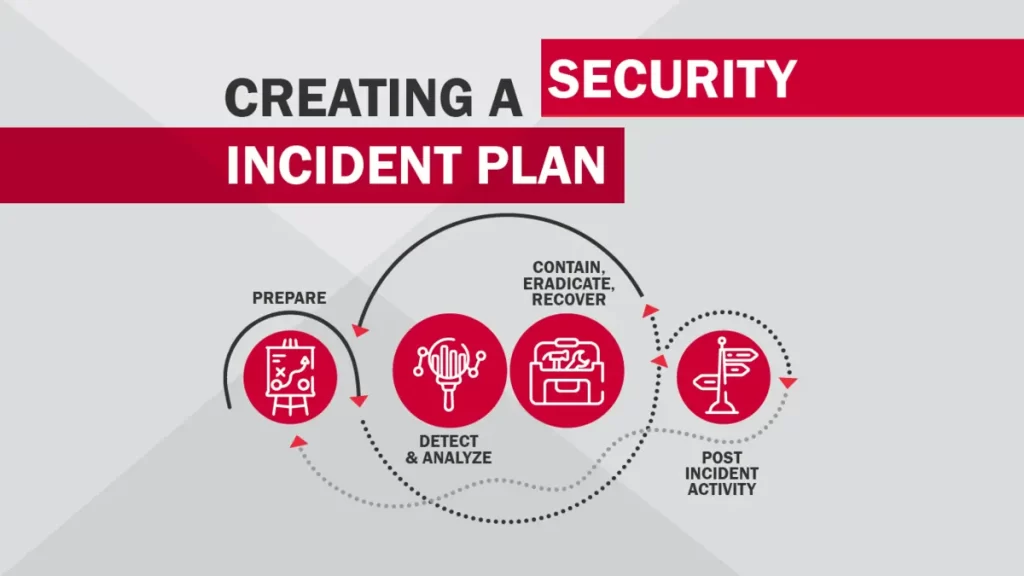IT career paths – everything you need to know to plan, kick-start, and level up your IT career: job roles, job titles, specializations, skills, certifications, salaries, and training resources, from entry level positions to senior level positions.
- IT industry employers
- Getting into IT
- Career path: IT Support (Technical Support)
- Career path: Systems
- Career path: Analysis
- Career path: Networking
- Career path: Database
- Career path: Programming
- Career path: Development
- Career path: Project
- Career path: Information Security
- IT career landscape
- IT training resources
You may also be interested in The Security Operations Center (SOC) career path.

IT industry employers
- Manufacturers of IT equipment (Cisco, Dell, Arista, Microsoft, etc.) that sell to large businesses such as Walmart, Amazon, etc.
- Value added resellers that sell IT products and services to smaller businesses
- MSPs – Managed Service Providers (for companies that do not want to hire IT specialists)
- ISPs – Internet Service Providers (AT&T, COMCAST, Verizon, etc.)
- IT recruiters
- Businesses, nonprofits, school systems, and government organizations
- Freelancing platforms (Upwork, Fiverr, Freelancer, Toptal, etc.)
Getting into IT
In the absence of a university degree, entry into the IT field can be accomplished through entry level support roles. Holding a bachelor degree (especially in computer science/information systems disciplines) becomes more relevant the more senior is the position. With a four-year degree one should be able to skip entry level support roles and move straight into a junior level role. With the right combination of IT industry certification and lab (hands on) experience gained through completed learning projects and/or demonstrated talent, a university graduate should be able to land an admin/analyst position as their first job in IT. See Information Technology Career Pathways by MicroTrain Technologies (Chicago, IL).
Career path: IT Support (Technical Support)
There are 400,000 U.S. job openings in IT and a $52,000 median entry-level salary in IT support, according to U.S. Burning Glass Labor Insight Report (data for 4/01/2021 – 3/31/22).
IT support is all about troubleshooting and problem solving, and providing great customer service along the way. This includes setting up computers for users within an organization, overseeing computer systems, and debugging whenever a problem arises. A job in IT can mean in-person or remote help desk work in a range of organizations across many different industries. (Google IT Support Professional Certificate)
There are generally three tiers or levels of IT support or “tech support” roles that level up to tech support management. Level one tech support is typically a customer service role set in a retail or call center environment. As the first line of support the focus is on helping the customer troubleshoot software and hardware issues. Related job titles include Technical Support Coordinator, Computer Specialist, Computer Support Specialist, Computer Technician, Help Desk Analyst, Support Specialist, and Technical Support Specialist.
Level two tech support typically requires more specialized product knowledge and does not involve taking front line calls. Related job titles include Technical Support Level 2, Help Desk Level 2, Desktop Systems Specialist Level 2, Information Technology Specialist 2, and Help Desk Tier 2.
Level three IT support positions tend to be specialized and are considered to be part of product development rather than general support. Related job titles include Technical Support Level 3, Help Desk Level 3, Desktop Systems Specialist Level 3, Information Technology Specialist 3, and Help Desk Tier 3.
Technical support managers train and coordinate the company’s technical service staff. Tech support managers typically work with product development teams to improve and build documentation and support procedures.
Career path: Systems
A system administrator, or sysadmin, is a person who is responsible for the upkeep, configuration, and reliable operation of computer systems; especially multiuser computers, such as servers. The system administrator seeks to ensure that the uptime, performance, resources, and security of the computers he or she manages meet the needs of the users, without exceeding the budget. To meet these needs, a system administrator may acquire, install, or upgrade computer components and software; provide routine automation; maintain security policies; troubleshoot; train and/or supervise staff; or technical support in projects. (MicroTrain Technologies)
Systems administration is the field of IT that’s responsible for maintaining reliable computer systems in a multi-user environment. Sysadmins have a solid grasp of infrastructure services as well as cloud infrastructure setups and management of cloud resources. Sysadmins manage and configure servers and know how to use industry tools to manage computers, user information, and user productivity.
As articulated in the Google IT Support Professional Certificate course System Administration and IT Infrastructure Services, a system administrator is able to (after completing the course): ● Utilize best practices for choosing hardware, vendors, and services for your organization, ● understand how the most common infrastructure services that keep an organization running work, and how to manage infrastructure servers, ● understand how to make the most of the cloud for your organization, ● manage an organization’s computers and users using the directory services, Active Directory, and OpenLDAP, ● choose and manage the tools that your organization will use, ● backup your organization’s data and know how to recover your IT infrastructure in the case of a disaster, and ● utilize systems administration knowledge to plan and improve processes for IT environments.
Systems Administrator related job titles include System Admin, Server Administrator, IT Systems Administrator, and IT Administrator.
Systems Architect related job titles include Solution Architect, System Architect, Computer Systems Architect, Security Architect, Knowledge Architect, and Enterprise Architect.
Systems security analysts “plan, implement, upgrade, or monitor security measures for the protection of computer systems. May ensure appropriate security controls are in place that will safeguard digital files and vital electronic infrastructure. May respond to computer security breaches and viruses” (MicroTrain Technologies).
Systems Security Analyst related job titles include Information Security Administrator, Information Security Analyst, Data Security Analyst, Security Analyst, Security Engineer, and Systems Security Information Technology Specialist.
Career path: Analysis
A computer systems analyst helps a company or other organization use computer technology effectively and efficiently. He or she incorporates new technology into a company’s current system after doing a cost benefit analysis to determine whether doing so is financially sound and will serve the entity well. (MicroTrain Technologies)
Jr. Analyst, Analyst, and Sr. Analyst related job titles include Applications Analyst, Applications Systems Analyst, Software Analyst, Systems Analyst, Technical Analyst, Programmer Analyst, Business Analyst, and Applications Developer.
Career path: Networking
Network administrators, engineers, and architects are responsible for implementing, maintaining, supporting, developing and, in some cases (engineers and architects), designing communication networks within an organization or between organizations.
Network admins analyze and resolve end user hardware and software computer problems, and provide end user training where required. Network admins “ensure the stable operation of the inhouse computer network and all connected PCs and peripherals, including planning, developing, installing, configuring, maintaining, supporting, and optimizing all network hardware, software, and communication links” (MicroTrain Technologies).
Network Administrator related job titles include Network Admin, Cisco Network Engineer, LAN Systems Administrator, Network Support Administrator, Network Support Coordinator, Network Engineer, and Network Manager.
Network Architect related job titles include Network Systems Consultant, Network Systems Integrator, Network/Telecom Engineer, Networking Engineer, Networking Systems and Distributed Systems Engineer, Telecommunication Systems Designer, and Design Engineer.
Network security analysts “plan, implement, upgrade, or monitor security measures for the protection of computer networks. May ensure appropriate security controls are in place that will safeguard digital files and vital electronic infrastructure. May respond to computer security breaches and viruses” (MicroTrain Technologies).
Network Security Analyst related job titles include Network Security Administrator, Network Security Engineer, Network Security Officer, Security Analyst, Security Engineer, and Systems Security Information Technology Specialist.
Key computer networking skills include (Google IT Support Professional Certificate): ● Knowledge of computer networks in terms of a five-layer model, ● comprehension of all of the standard protocols involved with TCP/IP communications, ● understanding of network troubleshooting tools and techniques, ● understanding of network services like DNS and DHCP that help make computer networks run, and ● understanding of cloud computing, everything as a service, and cloud storage.
Career path: Database
A database professional is responsible for the performance, integrity and security of a database. They will also be involved in the planning and development of the database as well as troubleshooting any issues on behalf of the users. Job roles vary depending on the needs of the organization, type of database, business process and the capabilities of the database management system in use. (MicroTrain Technologies)
Jr. Database Administrator related job titles include Database Administrator, Database Technician, Database Tester, Database Analyst, and Database Coordinator.
Database Administrator related job titles include Database Administrator, Database Developer, Oracle Developer, Oracle DBA, and MySQL Administrator.
Sr. Database Administrator related job titles include Data Warehousing Engineer, Sr. MySQL Administrator, Database Administration Manager, Database Developer, Database Engineer, DBMS Specialist, and Databases Software Consultant.
Database Architect related job titles include Artificial Intelligence Specialist, Database Architect, Information Architect, Information Engineer, Knowledge Architect, Consultant, Strategic Business and Technology Intelligence, Systems Development Manager, and Security Architect.
Database security analysts “plan, implement, upgrade, or monitor security measures for the protection of database systems. May ensure appropriate security controls are in place that will safeguard digital files and vital electronic infrastructure. May respond to computer security breaches and viruses” (MicroTrain Technologies).
Database Security Analyst related job titles include Information Security Administrator, Application Systems Administrator, Information Security Analyst, Data Security Analyst, Security Analyst, Security Engineer, and Systems Security Information Technology Specialist.
Career path: Programming
A programmer turns specifications into working code for a specific system or platform.
Jr. Programmer related job titles include Analyst Programmer, .NET Developer, Applications Programmer, Beta Tester, Business Programmer, Programmer, Programmer Analyst, and Software Programmer.
Programmer related job titles include Systems Engineer, .NET Developer, Applications Programmer, Business Programmer, Programmer, Programmer Analyst, Software Programmer, Java Programmer, and Video Game Programmer.
Sr. Programmer related job titles include Systems Engineer, lead Programmer, Database Programmer, Sr. Java Programmer, Operating System Programmer, Software Engineer, and Software Programmer.
Career path: Development
Developers are the brains behind the design, installation, testing and maintenance of software systems. Development is a cross-disciplinary career path typically requiring hardware, systems, database and programming knowledge. (MicroTrain Technologies)
Jr. Developer related job titles include Systems Engineer, Web Developer, Applications Developer, Programmer, Internet Programmer, Systems Programmer, .Net Developer, Jr LAMP Stack Developer, Jr. Full Stack Developer, and Jr. Openstack Developer.
Developer related job titles include Systems Engineer, Web Developer, Applications Developer, Programmer, Internet Programmer, Systems Programmer, .Net Developer, LAMP Stack Developer, Full Stack Developer, and Openstack Developer.
Sr. Developer related job titles include Systems Engineer, Web Developer, Applications Developer, Programmer, Internet Programmer, Systems Programmer, .Net Developer, Sr. LAMP Stack Developer, Sr. Full Stack Developer, Sr. Openstack Developer, and Lead Developer.
How to become a software engineer with no experience (Self-taught Roadmap 2022)
1. Learn Python from freeCodeCamp’s Python in 4 hours Full Course: Learn Python – Full Course for Beginners [Tutorial]
Master: variables, functions, conditional statements, loops, lists, dictionaries, objects, and interfaces.
2. Web development: HTML, CSS, Git, JavaScript, Portfolio Site, Node.js backend, React framework, Database Firebase/MongoDB, Crud Apps.
3. Learn the common data structures: lists, stacks, queues, linked lists, trees, graphs, tries, and hash tables.
4. Do some LeetCode problems (interview prep).
Career path: Project
Plan, initiate, and manage information technology (IT) projects. Lead and guide the work of technical staff. Serve as liaison between business and technical aspects of projects. Plan project stages and assess business implications for each stage. Monitor progress to assure deadlines, standards, and cost targets are met. (MicroTrain Technologies)
Related job titles for Project Coordinator, Assistant Project Manager, and Project Manager include IT Manager, IT Project Manager, Manager of IT, Program Manager, Project Manager, Project Manager/Team Coach, Senior Lead Project Manager, Senior Project Leader/Team Lead, Technical Project Lead (Project Manager), and Transition Program Manager.
Career path: Information Security
Information security is not as much a career path as it is a specialization within various IT career paths. Information security specialists within organizations often take the role of analysts. Information security is a sub-area of IT security within organizations. A cybersecurity role is likely a second IT job at the earliest, but entry level cybersecurity positions do exist.
Information security analysts “plan, implement, upgrade, or monitor security measures for the protection of computer networks, systems, applications and information. May ensure appropriate security controls are in place that will safeguard digital files and vital electronic infrastructure. May respond to computer security breaches and viruses” (MicroTrain Technologies).
Information Security Analyst related job titles include Computer Security Specialist, Computer Specialist, Data Security Administrator, Information Security Analyst, Information Security Manager, Information Security Officer, Information Security Specialist, Information Systems Security Analyst, Information Technology Security Analyst, and Information Technology Specialist.
In the words of Google IT Support Professional Certificate course IT Security: Defense against the digital dark arts, key IT security skills/knowledge include: ● How various encryption algorithms and techniques work as well as their benefits and limitations, ● various authentication systems and types, ● the difference between authentication and authorization, ● how to evaluate potential risks and recommend ways to reduce risk, ● best practices for securing a network, and ● how to help others to grasp security concepts and protect themselves.
IT career landscape
| IT Career Paths and Roles | Certifications Security Certification Roadmap (Paul Jerimy Media) | Skills/Technologies | #Ads on LinkedIn (Canada) Sep. 2022 | Salary |
| 1. IT Support/Technical Support | CompTIA A+ | |||
| 2. Systems/System | ||||
| System Administrator | Azure Administrator Associate, Network+, Linux+, Security+, VMWare Certified Professional, RHCSA | Linux, Windows Server – Active Directory: database and services (IAM), DNS Server, DHCP Server, and Group Policy; Windows 365 Cloud PC | 2215 | The national average salary for a Systems Administrator is C$73,040 (Glassdoor) |
| Cloud System Administrator | Amazon AWS, Microsoft Azure, Google Cloud, Oracle | 943 | ||
| System Engineer Builds and manages Windows/Linux servers | 2768 | C$83,574 per year (Glassdoor) | ||
| System Architect | 9103 | |||
| Systems Analyst | ||||
| Systems Security Analyst | SSCP – Systems Security Certified Practitioner (ISC)² | Cloud security | 2378 | The national average salary for a Security Analyst is C$73,700 (Glassdoor) |
| 3. Analysis | ||||
| Systems Analyst | ||||
| Systems Security Analyst | ||||
| Network Analyst | ||||
| Network Security Analyst | ||||
| IT Analyst/IT Security Analyst | ||||
| IT Business Analyst | Cloud Applications, Data Analysis | 1874 | ||
| 4. Networking | ||||
| Network Administrator | Network+, CCNA, AWS Certified Solutions Architect – Associate, Azure Network Engineer Associate, Palo Alto PCNSA, JNCIA-Junos | 1892 | The national average salary for a Network Administrator is C$68,908 (Glassdoor) | |
| Network Engineer Builds and manages computer networks | Network+, CCNA, CCNP Enterprise, Cisco DevNet Associate, AWS Certified Advanced Networking – Specialty | Python network programming | 6962 | C$76,751 per year (Glassdoor) |
| Network Security Engineer | Network+, Security+, CCNA, CCNP Enterprise, CCNP Security, AWS Security | Networking, Active Directory, server technologies, firewalls, light pen testing, scripting | The national average salary for a Network Security Engineer is C$95,419 (Glassdoor) | |
| Network Architect | ||||
| Network Analyst | ITIL, A+, Network+, CCNA | Routing, Switching, Wireless, VoIP, Security | 1172 | The national average salary for a Network Analyst is C$71,149 (Glassdoor) |
| Network Security Analyst | ITIL, A+, Network+, Security+, CCNA | The U.S. Department of Labor (DOL) classifies this job role as Information Systems Security Analyst 151122.00. Expected starting annual salary between $89,643 and $111,280. | ||
| 5. Database | ||||
| Database Administrator | Microsoft SQL Server, MySQL, Oracle, Linux | 5350 | The national average salary for a Database Administrator is C$79,523 (Glassdoor) | |
| Database Developer/Designer/Architect/Engineer The database development life cycle (The Open University free course) | Meta Database Engineer Professional Certificate | 1282 | The average salary for a Database Engineer is C$113,437 (Glassdoor) | |
| 6. Programming | ||||
| 7. Development | ||||
| Frontend Developer | Meta Front-End Developer Professional Certificate | HTML, CSS, JavaScript, React (library), Angular (framework), TypeScript, WordPress, Shopify, SEO | ||
| Backend Developer | Meta Back-End Developer Professional Certificate | Java/Spring, Python/Django, PHP LAMP stack, Data Structures and Algorithms, APIs, Git | ||
| Fullstack Web Developer | HTML, CSS, JS, jQuery, PHP, Node.js (runtime environment that executes JavaScript code outside a web browser), Python, MySQL (database management system), Linux (server administration), git (version control system), gulp and grunt (task runners), webpack (module bundler) | |||
| Mobile Engineer | ||||
| Data Engineer | Design data collection and analysis pipelines; Apache Hadoop | |||
| Game Developer | ||||
| QA Engineer | ||||
| 8. Project | ||||
| Project Manager/Coordinator | CAPM, ITIL, Six Sigma | |||
| Product Manager Prioritizes what product to build based on customer needs and company competencies/resources. | The U.S. Department of Labor (DOL) classifies this job role as Information Technology Project Managers 151199.09. | |||
| 9. DevOps YouTube links to learn DevOps | Network+, CCNA, CCNP Enterprise, Cisco DevNet Professional | Python network programming; Linux administration; Infrastructure as a Code (Ansible – puppet – terraform); Containers; Kubernetes; CI/CD (Git and Jenkins); Monitoring tools (grafana and prometheus); Cloud Computing (e.g., AWS or Azure) | ||
| 10. GRC (Governance, Risk Management, and Compliance) The GRC approach to managing cybersecurity (the GRC analyst/manager role) | ||||
| 11. Information Security Entry-level cyber security roles: MSSP: *SOC Analyst *Cyber Defense Incident Responder (Blue Team) *Cyber Forensics Expert *Cyber Operator (Red Team/Ethical Hacker) Enterprise: *Jr. Cyber Security Engineer *Vulnerability Assessment Analyst *Penetration Tester/Ethical Hacker | Security+, CySA+, Pentest+, OSCP, CEH, CISSP, CISM |
IT training resources
CBT Nuggets
Training for the most sought-after Cisco certifications and skills. All the cybersecurity training you need. Check out their IT Paths training packages/stacks (US$59 monthly subscription)
Cybrary
Hands on training for cybersecurity career paths “mapped down to the specific skill level you will need” laid out in three categories: Beginner, Intermediate, and Advanced (US$59 monthly subscription)
Google IT Support Professional Certificate
Over 5 courses, this program will quality learners for IT support jobs such as help desk technician, systems analyst, support specialist, database administrator, and IT technician (US$39 monthly subscription)
Hack The Box
“The world’s largest hacking community.” Kickstart and level up your career in cybersecurity through “the most captivating, gamified, hands-on training experience” (US$20 VIP Plus monthly subscription)
ITProTV (ACI Learning)
IT training to pass your IT certification tests and get a great job (US$59 premium monthly subscription)
Network Engineer Academy
Training to help you become a Network, Cloud, DevOps, or Cyber Security Engineer and achieve an income of US$130,000+ in record time (US$77 monthly membership)
Pluralsight
Learn “the right skills in the right order.” Paths “combine specific courses and tools into one experience to teach you any given skill from start to finish” (US$29 premium monthly subscription)
TCM Security Academy
“Absolutely no filler” information security courses. Purchase a course and gain lifetime access to it at US$29.99 or subscribe to an All-Access Membership to access all courses at US$29.99 per month
TryHackMe
Hands on cyber security training through real-world scenarios for all skill levels (£8 premium monthly subscription)
Free IT training resources
Cyber Aces Free Cyber Security Training Course (SANS)
This course covers the three foundation areas of information security – operating systems, networking, and system administration
Key references
Google IT Support Professional Certificate (Coursera)
Information Technology Career Pathways by MicroTrain Technologies (Chicago, IL)
Introduction to IT & Cybersecurity (Cybrary course)
Related content
Compliance frameworks and industry standards
How to break into information security
Job roles in IT and cybersecurity
Network security risk mitigation best practices
Professional ethical hacking body of knowledge
The GRC approach to managing cybersecurity
The penetration testing process
The Security Operations Center (SOC) career path
Back to DTI Courses



